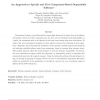Free Online Productivity Tools
i2Speak
i2Symbol
i2OCR
iTex2Img
iWeb2Print
iWeb2Shot
i2Type
iPdf2Split
iPdf2Merge
i2Bopomofo
i2Arabic
i2Style
i2Image
i2PDF
iLatex2Rtf
Sci2ools
168
Voted
HASE
2002
IEEE
2002
IEEE
An Approach to Specify and Test Component-Based Dependable Software
Components (in-house or pre-fabricated) are increasingly being used to reduce the cost of software development. Given that these components may not have not been developed with dependability as a driver, the components need to be adapted to deal with errors coming from their environment. To achieve this, error containment wrappers are often added to increase the robustness of such components. Adopting a gray-box perspective of software, we first present a modular approach for specifying and verifying embedded software made from components, based on concepts from category theory. This modular approach allows the system designer to check for semantic compatibility. To generate the error containment wrappers needed for adaptation, we subsequently present an algorithm that systematically generates the required wrappers. Using the information obtained through wrapper design, we develop an approach to identify relevant test cases to test individual components. We further exploit the modula...
Related Content
| Added | 14 Jul 2010 |
| Updated | 14 Jul 2010 |
| Type | Conference |
| Year | 2002 |
| Where | HASE |
| Authors | Arshad Jhumka, Martin Hiller, Neeraj Suri |
Comments (0)

